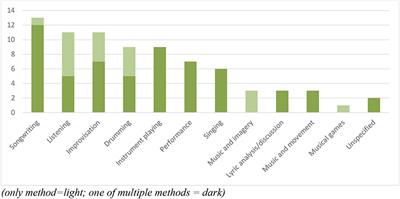
Medicine by Alexandros G. Sfakianakis,Anapafseos 5 Agios Nikolaos 72100 Crete Greece,00302841026182,00306932607174,alsfakia@gmail.com,
Ετικέτες
Τετάρτη 26 Φεβρουαρίου 2020
Music, Rhythm and Trauma: A Critical Interpretive Synthesis of Research Literature
Music, Rhythm and Trauma: A Critical Interpretive Synthesis of Research Literature:
 Recent theorizing about the connection between the brain and trauma (Perry, 2009; Porges, 2011; van der Kolk, 2015) has led to a burgeoning of interest in the provision of music-based programs with people who have had adverse experiences. Although there has been critique of the lack of scientific basis of these theories and their implications for practice (McLean, 2016), they remain popular with practitioners who are keen to introduce innovative and potentially beneficial approaches to the people with whom they work. Music therapists have a long tradition of working with traumatized clients, however, the brain-based rationales did not seem congruent with the less predictable and more idiosyncratic benefits reported, which seem to occur through more psychodynamic mechanisms of action. In order to unravel what seemed to be a body of literature plagued by the conflation of theories, we undertook a critical interpretive synthesis of literature in the past 10 years to cross-examine the ways that music and trauma have been connected. To do this we extracted data from 36 identified articles to distinguish what music methods were used, what claims were made about benefits, what theoretical justifications were provided and how much research basis there was for the claims being made. Having systematically disentangled the various dimensions, we then constructed a spectrum of approaches that offers a logical categorization of four different ways of using music with people who have had adverse life experiences. These included using music for stabilizing, entrainment, expressive and performative purposes. Specific music-based methods were proposed for those associated with brain-based rationales, and more responsive, multi-method approaches were congruent with recovery and social change models. Future research would benefit from a more clearly articulated connection between theoretical rationale, music-based methods, benefits and research approaches. The resultant spectrum may provide useful guidance for both practice and research design.
Recent theorizing about the connection between the brain and trauma (Perry, 2009; Porges, 2011; van der Kolk, 2015) has led to a burgeoning of interest in the provision of music-based programs with people who have had adverse experiences. Although there has been critique of the lack of scientific basis of these theories and their implications for practice (McLean, 2016), they remain popular with practitioners who are keen to introduce innovative and potentially beneficial approaches to the people with whom they work. Music therapists have a long tradition of working with traumatized clients, however, the brain-based rationales did not seem congruent with the less predictable and more idiosyncratic benefits reported, which seem to occur through more psychodynamic mechanisms of action. In order to unravel what seemed to be a body of literature plagued by the conflation of theories, we undertook a critical interpretive synthesis of literature in the past 10 years to cross-examine the ways that music and trauma have been connected. To do this we extracted data from 36 identified articles to distinguish what music methods were used, what claims were made about benefits, what theoretical justifications were provided and how much research basis there was for the claims being made. Having systematically disentangled the various dimensions, we then constructed a spectrum of approaches that offers a logical categorization of four different ways of using music with people who have had adverse life experiences. These included using music for stabilizing, entrainment, expressive and performative purposes. Specific music-based methods were proposed for those associated with brain-based rationales, and more responsive, multi-method approaches were congruent with recovery and social change models. Future research would benefit from a more clearly articulated connection between theoretical rationale, music-based methods, benefits and research approaches. The resultant spectrum may provide useful guidance for both practice and research design.

Αναρτήθηκε από
Medicine by Alexandros G. Sfakianakis,Anapafseos 5 Agios Nikolaos 72100 Crete Greece,00302841026182,00306932607174,alsfakia@gmail.com,
στις
10:11 μ.μ.

Ετικέτες
00302841026182,
00306932607174,
alsfakia@gmail.com,
Anapafseos 5 Agios Nikolaos 72100 Crete Greece,
Medicine by Alexandros G. Sfakianakis,
Telephone consultation 11855 int 1193
Εγγραφή σε:
Σχόλια ανάρτησης (Atom)

Δεν υπάρχουν σχόλια:
Δημοσίευση σχολίου